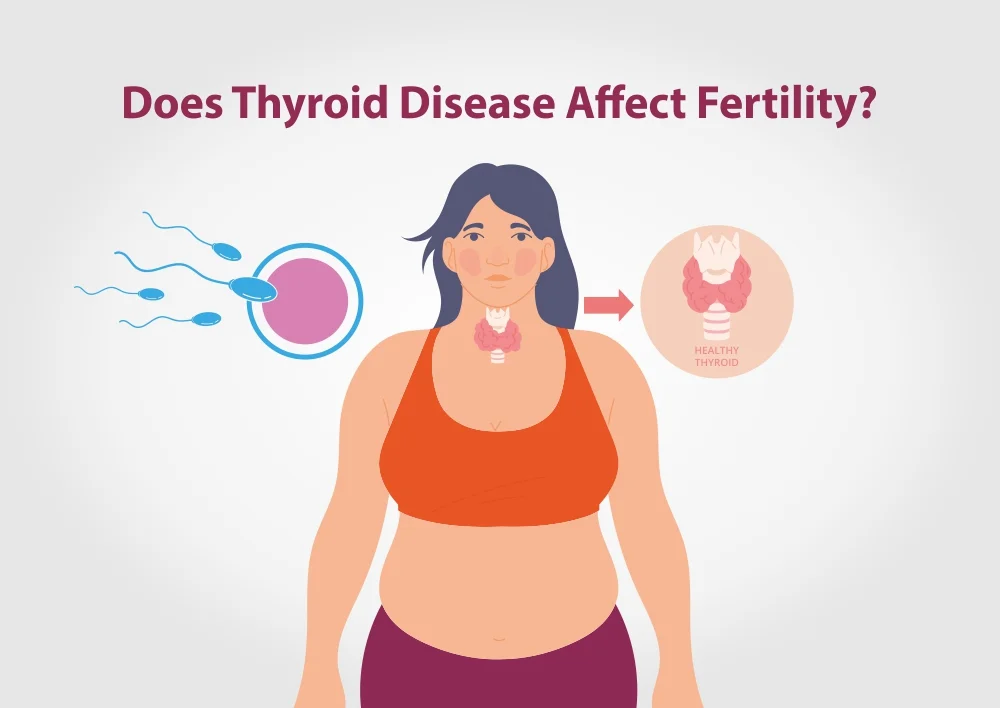Does Thyroid disease affect Fertility?
Thyroid disease is a common condition that affects the function of the thyroid gland, a small butterfly-shaped organ located in the neck. The thyroid gland produces hormones that regulate various body processes, including metabolism, growth, and development.
There is growing evidence that thyroid disease can also affect fertility. In both men and women, thyroid hormones play a crucial role in the regulation of reproductive function. An overactive or underactive thyroid can disrupt the menstrual cycle and impair ovulation, making it difficult for couples to conceive. In this blog post, we will explore how thyroid disease can affect fertility and what can be done to diagnose and treat the condition in people trying to conceive. If you have Thyroid disease, you can search for the best Fertility specialist near you, to get the fertility treatment.
How thyroid disease can affect fertility
As we discussed in the introduction, thyroid hormones play a crucial role in the regulation of reproductive function. In women, thyroid hormones help regulate the menstrual cycle and promote ovulation, the release of a mature egg from the ovary. In men, thyroid hormones are necessary for the production of healthy sperm.
An overactive thyroid, or hyperthyroidism, can cause a woman’s menstrual cycle to become irregular or even stop altogether, making it difficult for her to conceive. On the other hand, an underactive thyroid, or hypothyroidism, can also disrupt the menstrual cycle and impair ovulation.
Thyroid disease can also affect the quality of eggs and sperm. In women, hyperthyroidism has been linked to a higher risk of miscarriage and birth defects, likely due to the harmful effects of excessive thyroid hormones on the developing fetus. In men, hypothyroidism can cause a decrease in sperm count and motility, potentially impairing fertility.
Furthermore, thyroid disease can impact the ability of a fertilized egg to implant in the uterus and develop into a healthy pregnancy. Hyperthyroidism has been associated with a higher risk of implantation failure and early pregnancy loss, while hypothyroidism has been linked to a higher risk of preterm birth and low birth weight.
In summary, thyroid disease can affect fertility by disrupting the menstrual cycle and ovulation, impairing the quality of eggs and sperm, and affecting implantation and early pregnancy.
Risk Factors of Thyroid Disease
Anyone can develop thyroid disease. Not only adults but also infants, teenagers, and the elderly can develop the condition. Thyroid disease can be present from birth and may progressively worsen over time as a person ages. You could be at a higher risk of developing thyroid disease if:
- You have a family history of thyroid disease.
- Taking a medication that’s high in iodine.
- You have had a thyroid condition or cancer in the past.
- You have health conditions such as anemia, Type 1 diabetes, lupus, or rheumatoid arthritis.
- Lifestyle factors such as smoking and high levels of stress.
- Injury or trauma to the thyroid
Diagnosing and treating thyroid disease in people trying to conceive
If you are trying to conceive and have a history of thyroid disease or symptoms such as fatigue, weight changes, or hair loss, it is important to have your thyroid function tested before attempting to get pregnant. A simple blood test can measure the levels of thyroid hormones and thyroid-stimulating hormone (TSH) in your body and determine if your thyroid is functioning properly.
If the test results indicate that you have an overactive or underactive thyroid, your doctor will recommend a treatment plan to restore your thyroid function to normal levels. The most common treatment for thyroid disease is medication, which can help regulate the production and release of thyroid hormones. In some cases, lifestyle changes such as a healthy diet and regular exercise can also help manage thyroid disease.
- Diet:
Good nutrition is essential for both thyroid function and healthy pregnancy. Blueberries, strawberries, raspberries, carrots, spinach, and sweet potatoes are all excellent vegetables to add to your diet.
- Medication:
Many women with thyroid disorders cannot get pregnant without the help of ovulation drugs. Thyroid medication is safe and typically has the same molecular structure as the hormones you produce naturally. These drugs can help you ovulate and become pregnant. You can work with a doctor or fertility specialist to find the most effective dosage and type of medication.
- Regular Exercise:
Incorporating aerobic exercise such as running, cycling, and swimming into your daily routine can keep your metabolism at an optimal level. Also, meditation and deep breathing exercises can help manage your stress levels.
- Lifestyle management:
Maintain a healthy lifestyle by getting sufficient sleep, removing sugar from diet, and avoiding smoking, excessive alcohol consumption, junk food, and processed food. These lifestyle factors can positively impact thyroid function and overall well-being.
It is important to monitor and adjust your treatment during pregnancy, as your thyroid hormone requirements may change. Your doctor will likely recommend regular blood tests to check your thyroid function throughout pregnancy and adjust your medication as needed. Miracles Fertility & IVF clinic provides you the best Fertility specialists in Gurgaon.
In conclusion, having a thyroid function test before attempting to conceive is important for people with a history of thyroid disease or symptoms. Treatment with medication and lifestyle changes can help restore normal thyroid function and improve the chances of a healthy pregnancy.

 Appointments
Appointments


.webp)


